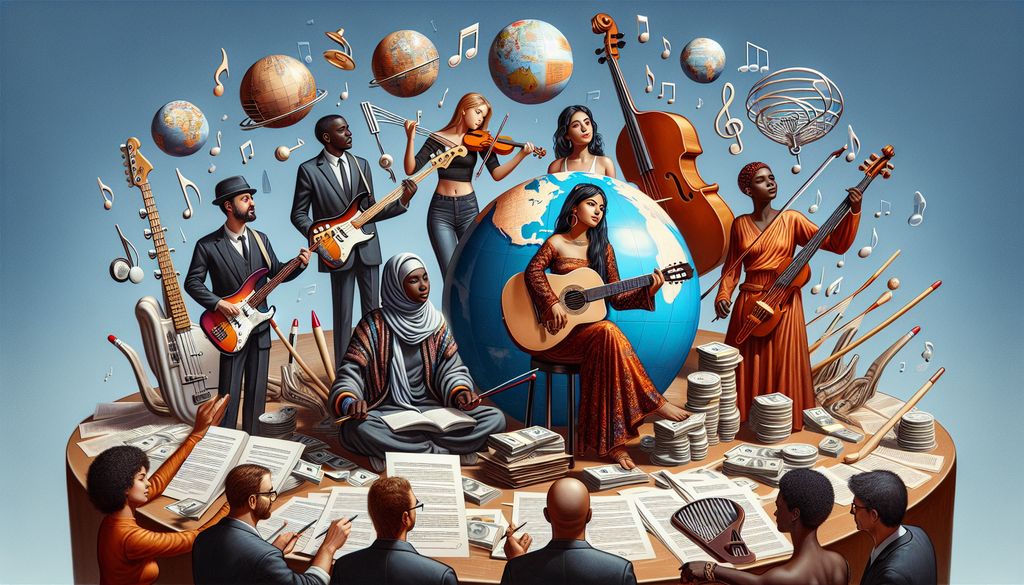Navigating Copyright and Trademark Law as a New Artist in Today’s Music Industry
Written by DJ Prodigee on Tue Feb, 2024
As an up and coming musical artist, navigating the complex landscape of the modern music industry can be daunting. Understanding the intricacies of copyright and trademark law is essential for protecting your creative work and ensuring fair compensation. This article aims to provide essential tips and insights to help aspiring artists thrive in the music industry, focusing on copyright and trademark law.
Key Takeaways
- Register your songs with the copyright office to make it official.
- Read the fine print and watch out for any clauses that could compromise your ownership.
- When in doubt, get a music lawyer on your side to navigate the treacherous waters of music publishing.
- Remember, your songs are your babies, and you don’t want them ending up in the wrong hands.
- Stay vigilant and keep those melodies close to your heart.
The Legal Side of Making Music
Navigating Copyright and Trademark Law in the Modern Music Industry
Alright, you musical mavericks and melody makers, let’s dive into the legal riff-raff of the music biz. Copyrights and trademarks are like the bouncers of the music industry, keeping your tunes safe from the grubby hands of idea thieves. But navigating this legal labyrinth can be more confusing than explaining the plot of ‘Inception’ to a toddler.
Understanding the intricacies of copyright and trademark law is essential for protecting your creative work and ensuring fair compensation. It’s not just about slapping a copyright notice on your album cover; it’s about knowing your rights and how to enforce them. Think of it as your musical armor in the battle against those who might try to play your riffs without giving credit where it’s due.
Here’s a quick rundown of what you need to know:
- Fair Use: It’s like getting a hall pass to use someone else’s music, but there are rules.
- Royalty Distribution: Who gets what when your song plays on the radio or streams online.
- Sync Licensing: When your track gets that sweet spot in a movie or commercial.
Remember, your songs are your babies, and you don’t want them ending up in the wrong hands. Stay vigilant and keep those melodies close to your heart.
Building Your Brand in the Music Industry
From Bathroom Selfies to Billboard Charts: Building Your Brand
So, you’ve ditched the duck face and want to be the next big thing to hit the music scene? Let’s get down to brass tacks and talk branding. It’s not just about a snappy name or a funky logo; it’s about carving out your unique space in the music universe.
Here’s the lowdown on making your mark:
- Define your brand: Who are you as an artist? What’s your sound? Nail this down, and you’re halfway there.
- Craft your online persona: Your website and social media are your digital stage. Keep ’em clean, keep ’em fresh.
- Engage like a pro: Talk to your fans, not at them. Social media isn’t just a megaphone; it’s a two-way street.
- Stay consistent: Your brand is your promise to your fans. Break it, and you’re back to square one.
Your brand is the story you tell the world, and more importantly, the story they believe about you.
Remember, folks, in the digital age, your brand is everything. It’s the difference between being a one-hit-wonder and a legend. So, whether you’re making magic in the studio or shredding it on stage, make sure your brand’s singing the same tune.
Managing Your Finances as a Musician
Broke Musicians and Expensive Guitars: Managing Your Finances
So, you’ve got your heart set on that vintage Gibson Les Paul, but your bank account is screaming for mercy. Welcome to the world of broke musicians and expensive guitars. But fear not, fellow rockstar, managing your finances in the music industry doesn’t have to be a solo act. Here are some tips to keep you from going broke while chasing your dream:
-
Separate your personal and business finances. It’s essential to keep your personal and business finances separate. Set up a dedicated bank account and credit card for your music-related income and expenses. This will make your life a whole lot easier come tax season.
-
Avoid common financial pitfalls. Many musicians fall into the trap of spending all their gig money on new gear or partying. Remember, your music is a business, and you need to invest in its growth.
-
Plan for the future. It’s easy to get caught up in the excitement of the moment, but don’t forget to plan for your future. This includes setting aside money for retirement and having a backup plan in case your music career doesn’t pan out.
Remember, the key to financial success in the music industry is to treat your music as a business. Keep track of your income and expenses, make smart financial decisions, and always plan for the future.
Conclusion
So, you’ve made it through the legal maze of copyright and trademark law in the music industry. Congratulations, you’re now a certified legal rockstar! Remember, protecting your creative work is key, but don’t forget to rock on and keep making awesome music. Stay tuned for more legal adventures in the wild world of music! 🎸🎶
Frequently Asked Questions
What is the importance of understanding copyright and trademark law in the music industry?
Understanding copyright and trademark law is crucial for protecting your creative work, ensuring fair compensation, and avoiding legal issues such as infringement.
How can musicians protect their songs from being stolen or used without permission?
Musicians can protect their songs by registering them with the copyright office, reading and understanding contracts, and seeking legal advice when needed.
What are the key differences between copyright and trademark law in the music industry?
Copyright law protects original works of authorship, while trademark law protects symbols, names, and designs used to identify and distinguish goods or services in the market.
Why is it important for musicians to register their songs with the copyright office?
Registering songs with the copyright office provides legal evidence of ownership, making it easier to enforce rights and seek compensation in case of infringement.
How can musicians navigate the complexities of music publishing and licensing agreements?
Musicians can navigate music publishing and licensing agreements by seeking professional legal advice, understanding the terms and conditions, and ensuring their rights are protected.
What steps can musicians take to ensure their brand is protected in the music industry?
Musicians can protect their brand by registering trademarks, monitoring unauthorized use, and enforcing their rights through legal action if necessary.







